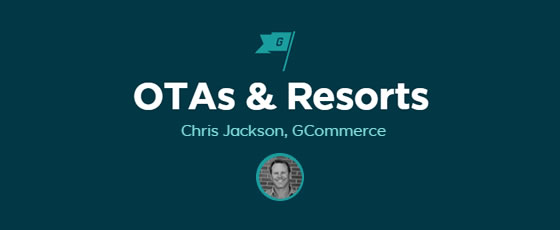Interviews
Is it Realistic for Resorts to Rid Themselves of OTAs? Chris Jackson of GCommerce Weighs in.


BLANCHARD
About a year ago I stumbled onto a company called GCommerce that helps “hotels & resorts to claim their share.” Their model intrigued me and I’ve looking for an excuse to get their take on something else that has intrigued me as of late: the balance and battle between hotel-direct booking and OTAs.
When I saw this tweet from GCommerce’s Chris Jackson…
Hotels still don't get it. Often they give lower rates or run promo on OTA & not on their website? Paid $40 less for Sonesta Ft. Lauderdale.
— Chris Jackson (@Chris_GCom) August 18, 2015
…I reached out to get some of my naive questions answered. Even though he was traveling, Chris obliged, and our conversation went like this.
—
Gregg: Chris, when I read that tweet my first, instinctive response is, “Why would they need to discount on both? They’re not competing with anyone else on their own site.” Where is the first, key flaw in that thinking?
Chris: The hotel doesn’t need to discount but if they are going to run a 25% off promotion on let’s say Expedia then they should at least match it on their own website. Reason being, consumers shop around for best price/value and they are going to book wherever they can get the best deal. If a consumer books through an OTA then the hotel is going to pay the OTA somewhere between 15% and 25% commission. If they got the booking direct then they are only going to pay their CRS (central reservation system or their website booking engine provider) somewhere around $5 or 1-3%. It’s all about acquiring g bookings at the lowest cost per acquisition (CPA) in order to maximize their bottom line profits.
Gregg: So if commissions on OTAs are so high and people are coming to the hotel websites anyway, why do these properties continue to use use them?
Chris: Properties use OTA’s because they have a vast distribution network and spend 100’s of millions of dollars advertising themselves so consumers have been conditioned to go there to seek out hotels in a destination where they don’t have a particular property in mind or they are loyal to. Properties are on these sites so that they can have market visibility with consumers that utilize OTA’s for research. Many consumers, after narrowing their consideration set down to say 3-4 hotels, will then go to the hotel’s website to “see more” about the hotel. Smart hoteliers can capture these consumers directly and get them to stop shopping and buy if they give them a compelling reason to do so. Might be a better rate or better value.
Gregg: So if I run a hotel and pay an OTA 25% commissions on let’s say a $200/night room. Someone comes to my site and I’m trying to snag them before they go back and book at the OTA. How much of that $50 I would have paid to the OTA should I put toward either a discount or value add to try to get them to buy through me directly?
Chris: Something less obviously, but doesn’t have to be a better rate. Value adds work but also connecting with them to make their travel planning easier is even better. They are not buying a hotel room or an accommodation but rather an experience. How can you make it easier or enhance the experience they are seeking is a better approach than just a discount.
Gregg: Any examples of clients or otherwise that have successfully done this?
Chris: A good example of a book direct strategy that works really well is used at The Strand Hotel in NYC. They offer a $40 dining credit to those who book through their website. This offer is only presented on their website and nowhere else. It also gets guests into their restaurant/bar where they surely spend a lot more than $40. Example below, but can also be seen on their website at http://www.thestrandnyc.com/default-en.html
Gregg: So is the eventual goal to be complete free of OTAs and have them disappear? Or is that even doable? If not, what would be an example of healthy vs unhealthy reliance on OTAs in terms of the percentage of bookings that come through them?
Chris: The OTA’s will never go away and I and just about every other industry expert believes they are here to stay and will most likely only get bigger and stronger. They have billion dollar market caps, are hugely profitable and consumers have grown to trust them. They are spending billions of dollars in marketing and advertising only further entrenching themselves into consumers as the go to travel site. This year alone the two biggest, Expedia and the Priceline Hotel Group, which combined account for about 94% of OTA market share worldwide, have increased their advertising spend by 20%-28% further increasing their brand and awareness.
Many hotels rely on them way to heavily and do not effectively manage their distribution, allowing the OTA’s to sell too many of their rooms during high demand periods when they would have sold out anyways. There is a place for them, but hotels should strive to have OTA’s account for less than 20% of their production. Often I see hotels have contributions from the OTA’s that are north of 50%. That greatly weakens the hotel’s bottom line profits.
Gregg: On that 20% number, should hotels ever try to get that number down to zero? Or is there enough value in the visibility OTAs provide that it’s just a matter of keeping it in balance?
Chris: Hotels should absolutely strive for zero OTA contribution. It takes a well known brand with lots of fervently loyal guests and an effective and efficient direct marketing effort. GCommerce has a client, The Lenox Hotel, that is located in the Back Bay of Boston. They have been around for over a hundred years. Their service and guest recognition is the best in the industry. They have a high rate of return from past guests.
And lastly, they invest hugely in direct marketing. Not to mention they have the industry’s best digital marketing agency in GCommerce. :) during high demand periods they get OTA contribution in the single digits. We have discussed potentially dumping OTA distribution all together and did some testing that showed they would be just fine most of the time without them, but there are times of the year that they need their support. During those slower times of the year the OTA’s aren’t displacing any direct or higher rated business, so they continue to work with them, but do so in a smart manner that doesn’t sell too much of their inventory when they could do without the OTA’s.
—
Huge thanks again to Chris and GCommerce for taking the time.
About Gregg & SlopeFillers
I've had more first-time visitors lately, so adding a quick "about" section. I started SlopeFillers in 2010
with the simple goal of sharing great resort marketing strategies. Today I run marketing for resort ecommerce and CRM provider
Inntopia,
my home mountain is the lovely Nordic Valley,
and my favorite marketing campaign remains the Ski Utah TV show that sold me on skiing as a kid in the 90s.
Get the weekly digest.
New stories, ideas, and jobs delivered to your inbox every Friday morning.
